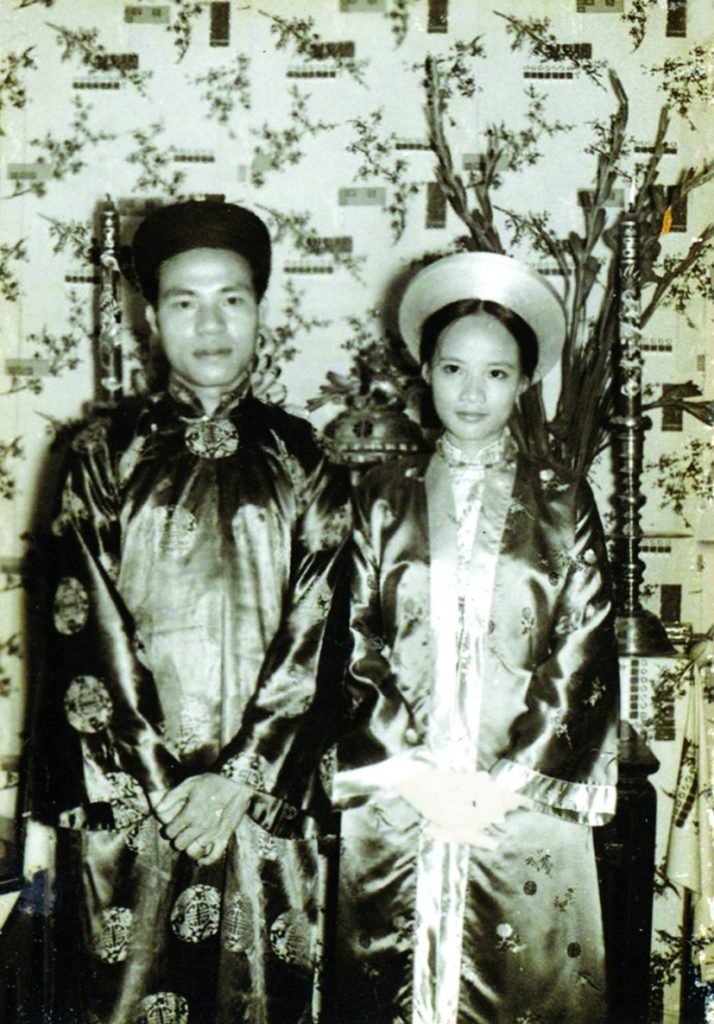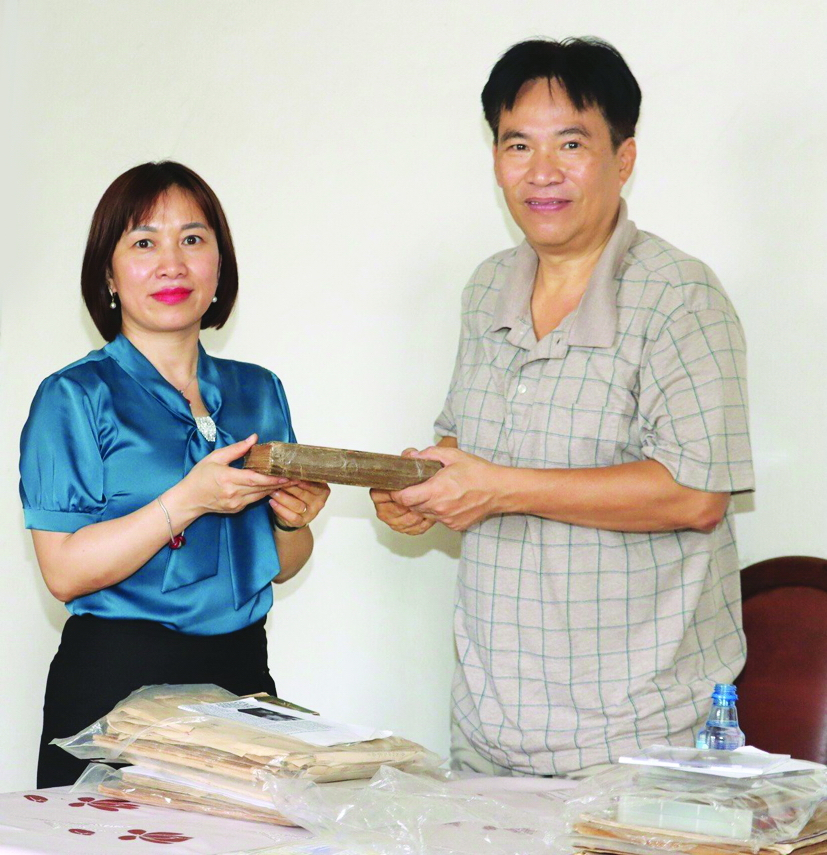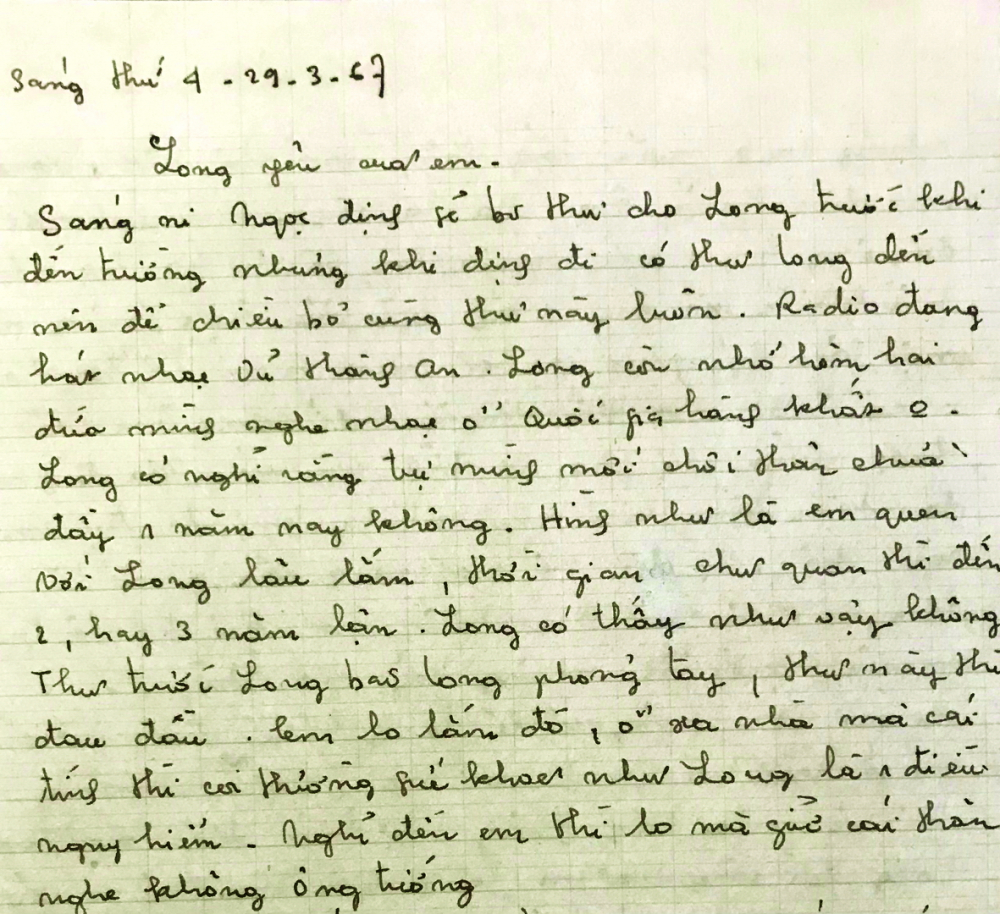The Letters Left Behind
Love became the powerful force that helped her overcome pain and loss, forging her will, determination, and resilience to face countless ups and downs, challenges, and to strive for a better life.

Ảnh cưới của bà Tôn Nữ Quỳnh Như và ông Trần Quang Long năm 1967
The Romance Between the Lady and the Poet
It’s been over a year since we’ve been apart. After being released from prison, I gathered all the letters you wrote me and had them bound into a book. Whenever I feel sad or miss you, I take it out and read it. I think to myself that I will always have your love by my side. We are apart because of the war, but don’t worry, my love, I won’t let you down.”
(Excerpt from a letter by Ton Nu Quynh Như to her husband, Tran Quang Long, 1968)
These poignant words, written by Mrs. Ton Nu Quynh Nhu to her beloved husband, Tran Quang Long, reveal the deep emotional bond they shared. Written on the back of the last letter she received from him, these words transport us back to their heart-wrenching story, one defined by love, sacrifice, and unwavering commitment to the nation.
Mrs. Ton Nu Quynh Nhu was the daughter of Professor Ton That Duong Ky, a prominent journalist and intellectual who was also the former General Secretary of the Central Committee of the Alliance of National, Democratic, and Peace Forces of Vietnam.
Born and raised in the historic city of Hue, she moved with her family to Saigon in 1959. In 1960, while still a student at Gia Long High School (now Nguyen Thi Minh Khai High School), she began participating in secret revolutionary activities under the guidance of Le Quang Vinh, a patriotic teacher and revolutionary who had been sentenced to death by the Americans and the Diem regime and exiled to Con Dao prison for 14 years.
After Le Quang Vịnh’s arrest, she had to leave school for a year to avoid being detected. In 1962, she passed the entrance exam to the Saigon University of Architecture and resumed contact with the revolutionary organization, quickly becoming an active participant in Saigon’s student movement. Despite her delicate, graceful appearance, she harbored a fierce patriotism, a deep commitment to the revolutionary cause, and a strong, determined character.
In 1964, at the Da Lat Summer Camp, she met poet Tran Quang Long. Their first exchange of letters was met with no response from her, but in 1967, while teaching in Quy Nhon, he returned to Saigon on weekends, and through a mutual friend, they were joyfully reunited.
From that point, despite his injury – he had to use crutches after being shot in the leg during a student protest in Quy Nhon – he made a point to visit her every weekend.
For Tran Quang Long, his feelings for Quynh Nhu were special – both deeply enamored and filled with respect and admiration. Quynh Nhu, though courted by many suitors from prominent families, chose to admire Tran Quang Long – a talented poet, a man with similar ideals, and one who exuded courage and resilience. Their love blossomed within the shared context of patriotism and revolutionary ideals.
The fiery, revolutionary poetry of Tran Quang Long, which called out to students, intellectuals, and young people to rise up for peace and independence, found great encouragement and support from Quynh Nhu.
In each letter she sent to him, she expressed her hopes for his poetry: “I hope your poetry will improve even more because I know you are still young. You see clearly the purpose of art and literature – they must serve a cause and create change. I hope you will progress, not only as a lover but as a friend to society and to our generation’s aspirations.” (Excerpt from a letter by Ton Nu Quynh Nhu to Tran Quang Long, 1967)
She also expressed her deep connection to the country she loved:
“Love for the country is always beautiful. Write more poems to praise our homeland, Long. When I was a little girl, I loved the house with the vegetable garden at your parents’ place. As a student, I loved the village of Thuan Cat and the Tran Cao Van Primary School. Growing up, I crossed the Thua Phu ferry four times a day, I fell in love with the Perfume River, the Trường Sơn mountains. Now, I have our magnificent country and you, Tran Quang Long, to love.” (Excerpt from a letter by Ton Nu Quynh Nhu to Tran Quang Long, 1967)
In 1967, Quynh Nhu and Tran Quang Long were married. After the wedding, he continued teaching away from home while she remained in Saigon, balancing her studies, work, and revolutionary activities while pregnant with their first child. Despite the constant dangers, the pressures of life, and the overwhelming responsibilities, she managed everything without complaint, supporting her husband wholeheartedly in his mission to educate, organize, and advocate for the student movement.
She placed her full trust in him, shared his ideals, and provided constant support. In her letters, she conveyed her love, encouragement, and excitement for their upcoming child:
“When you return, let’s go buy a book on how to raise children, so I can start learning. I already picture our little one growing healthy and strong. I hope he will have your smile and walk just like you.” (Excerpt from a letter by Ton Nu Quynh Nhu to Tran Quang Long, 1968)

Love Becomes Strength
In February 1968, Mrs. Quynh Nhu was arrested by the National Police. During this time, due to urgent duties, Tran Quang Long had to go to the liberated zone to join the establishment of the Alliance of National, Democratic, and Peace Forces of Vietnam without having the chance to say goodbye to his wife.
He sent her a heartfelt letter filled with sorrow:
“Leaving at this moment, when you are about to give birth and are in prison, fills my heart with deep regret. The hardships we are facing are shared by all, and when compared to the heroic sacrifices of so many others, ours is nothing. I cannot stay here, for I would only be trapped within these four walls, so I am forced to leave. I hope you will understand and forgive me. I trust that, although you may feel some sadness, you will accept my decision, and I know it is also your decision. You once agreed with me that we must endure for higher ideals, didn’t you?”
(Excerpt from a letter by Tran Quang Long to Ton Nu Quynh Nhu, February 26, 1968)
Little did she know that this farewell letter would be their final communication. As her due date approached, Mrs. Quynh Nhu remained imprisoned. Thanks to the protests of fellow prisoners, she was released temporarily to give birth. In the overwhelming joy of motherhood, she named her son Xuan Thang, in accordance with the agreement between her and her husband. However, her time with her newborn was heartbreakingly brief. She had to say a painful goodbye, leaving her infant son with her mother to care for, as she returned to prison.
Nearly a year in prison passed, and she received no word of her husband. When she was released, she was devastated to learn that her husband had fallen in battle on October 11, 1968, never having had the chance to meet their child.
Love became the powerful force that helped her overcome grief and loss, shaping her will, determination, and resilience to face countless struggles and setbacks. She graduated from Saigon University of Architecture after years of diligent, arduous study, becoming one of only two female architects in Saigon at the time.
After graduation, she continued to teach and work multiple jobs, balancing the responsibilities of being both a mother and father to her son Xuan Thang. She also became active in the youth movement of Saigon until the day of the country’s liberation.
After the reunification of the country, Mrs. Quynh Nhu worked at the Saigon General Design Institute, dedicating herself passionately to her work, while continuing to pour all her love and care into raising her son, Xuan Thang.

Một lá thư bà Tôn Nữ Quỳnh Như viết cho chồng
Though she had endured countless hardships and ups and downs, in the heart of the loyal and steadfast woman, Quynh Nhu, her deep love for her soulmate and comrade-in-arms, Tran Quang Long, remained unchanged. She cherished and preserved every moment, every memory, and every memento he had left behind.
**Though strong and resilient, there were moments when her heart felt empty, overwhelmed with longing for the husband she had lost. She poured the emotions hidden in her heart into letters written to her son:
“On Christmas Eve, I attended a banquet at the most luxurious hotel in Hanoi, built by the Cubans. I felt a deep sadness, missing your father and Sao so much. I will get to meet Sao again someday, but your father… I can never see him again. I hope you grow up quickly and become a good person, just like your father. I love him dearly, but he is no longer here, and you must make everyone see that you are worthy of your father’s legacy.”
(Excerpt from a letter by Ton Nu Quynh Như to her son Xuan Thang (Sao), December 1975)
A person never truly disappears if their image is etched deeply in the hearts of those who loved them. And Tran Quang Long, the martyr, will always live on in the heart, the consciousness, and the life of his devoted and loving wife, Quynh Nhu.
Thu Hoàn
(Source: The Ho Chi Minh Women’s Newspaper )
